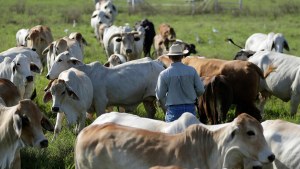Stewarding Resources to Preserve Food Security
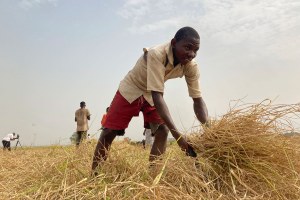 Play Podcast
Play Podcast
About the Episode
In order to ensure future generations have the opportunity to not only live but thrive on Earth, it is pivotal that we develop a smart and efficient global food system. Through encouraging young people to get involved in stewarding sustainable resources, such as clean water and arable land, it is possible to help create this food system and preserve Earth for their futures. In this episode of Youth in Agriculture: Transforming Local Food Systems, Natacha Akaliza and Peter McCornick discuss how we can manage and protect resources with this goal in mind, and the role young people can play.
[Intro music.
Natalie Burdsall: INTRO: Hello and welcome to the limited podcast series “Youth in Agriculture: Transforming Local Food Systems,” produced by the Chicago Council on Global Affair’s Center on Global Food and Agriculture. Today, we will be listening in on a conversation between two employees of the Daugherty Water for Food Global Institute – Natacha Akaliza, a program consultant based in Rwanda, and Peter McCornick, the Executive Director.]
Natacha Akaliza: My name is Natasha Akaliza and I am a program consultant with the Daugherty Water for Food Global Institute at the University of Nebraska and I am currently based in Rwanda in Africa.
Peter McCornick: Good morning. My name is Peter McCornick. I'm the Executive Director of the Daugherty Water for Food Global Institute. I'm based in Nebraska at the University of Nebraska, Lincoln. I have a few more year's experience than Natacha. Hah. I suppose the first question is in food and agriculture, what excites you about the food and agriculture from a global level, from a wide, broad perspective? What excites you about this space?
Natacha Akaliza: What excites me most about food and agriculture is the, like, the fact that I'm contributing towards, like, food security and ensuring that people who come after me are still getting the opportunity to enjoy the things that I have enjoyed while I was on Earth.
Peter McCornick: There's a lot of changes that agriculture and food, that sector, has to respond to. And a lot of this burden as we go forward responding to these... agriculture needs us to adjust and change. Much of that falls on the younger people, younger professionals—they need to be thinking ahead and what to do. How do you think we can work better at all kinds of ages, all kinds of professions? How do you think we can work better to address things that the climate crisis is bringing on, but also the water crisis and and even the youth bulge in Africa?
Natacha Akaliza: Yeah, I think most of the time the bigger decisions are made by, like, the people who have worked in this industry and therefore, like, what could be done better is educating people like young people, whether they're in, like in... whether they're working in food and agriculture. Like what could be done is getting the people who've been in the industry for quite a long time, who've been making the decision to include all the youth, whether they are in food and agriculture, but to educate them, not necessarily like tell them what to do, but mostly, like, involve them in the decision making or how the decisions are being made, so that they feel included or excited about what is being done, and so that they can decide therefore in the end, whether to now start working in food and agriculture or what they should be contributing regardless of whichever environment they're working in, so that they can be mindful about, for example, the climate change and all those other factors that are impacting food and agriculture. So, I think that's first, like, involving and educating the youth, but also, like, keeping in mind that things change. As much as, like, there is progress, the urbanization, like thinking about new methods, like, to do things differently, like flexible methods that adapt with time but that allow continuous food production.
Peter McCornick: You have now been back... you got your degree a couple of years ago and in this sector and you've been back in Rwanda two or three years now. What do you see the... when you're talking to your peers, what do you see as the opportunities for young people to get engaged in agriculture and food in Rwanda, and maybe now that you're experiencing more of Africa, other countries in the region?
Natacha Akaliza: In my experience being back, I also, like, did a degree, which is an added bonus within the, like, the field. But like that... I've seen how that has encouraged my siblings, my younger siblings, to also see that it is okay or a good thing to go into agriculture, which is... which was different compared to how it was like during my time when I was applying for universities. That was, like, something that if you don't have access to other schools, then you go to agriculture. So, I've seen how, like, my younger siblings are getting encouraged because they see me work.
Peter McCornick: I mean I... that was a really good answer, I really like that answer. One of the things that I heard... you and I were in the water scarce and agriculture forum in Cape Verde last month.
Natacha Akaliza: Yeah.
Peter McCornick: Cape Verde. And then I was meeting with a number of people in Washington last week and quite a few colleagues from Ethiopia and elsewhere, and one of the voices... one of the complaints I'm hearing is, or concerns, is that really that that the positions, the jobs for young professionals is quite--not just in the agricultural sector—but it's a lot of well trained people and the unemployment in that area is rising. You got any thoughts on that and what that means in your particular situation?
Natacha Akaliza: Just to clarify on that question, do you mean like the number of unemployment for young people is increasing or...?
Peter McCornick: Well it's really in the people like yourself who will come back into... have got trained and have got a degree and skills and so forth. But then the actual opportunities in the economy for young people in... back in their home countries is... it's not meeting, there's not enough opportunities to meet the supply of the well-educated young professionals returning.
Natacha Akaliza: Yes. I think that's also happening in Rwanda. I think that's a global issue, not only in agriculture, though, or like food and agriculture. I think that's, like, worldwide and in all different, like, fields where that there is limited amounts of jobs available for young people. So, we start businesses, be entrepreneurs within those fields that we've, like, we have knowledge about. And again, that is also a challenge because it's not like most of young people who are fresh graduates have the capital to start their own businesses as well, or have the training capacity to have sustainable businesses. So, that's a concerning issue, but I don't think that... I don't... I just feel like there is still hope because all the people, one way or the other, they are going to like give space even though it might be late, but I think they will give space.
Peter McCornick: Good answer, Natacha. And let me pass it back to you and feel free to ask me the awkward questions. I'm happy to try and answer them as best I can.
Natacha Akaliza: So what got you interested, like, in food and agriculture?
Peter McCornick: Well, I grew up on a farm, or what we call a farm in Scotland, but it's... in America we call it... it'd probably be more like a ranch, but there's basically farming, dairy, beef, and sheep, some crops. So, I was always involved in agriculture and then I just kind of used that. I got interested in water engineering. I mean I was very interested in seeing the world with my career and that really is what got me into this space that I'm in and I've been kind of boring from that perspective. I've pretty much stayed in that space. But one of the one of the good things about this space is the one thing we've been talking about is the change in conditions. So, with the population growth and economies growing, the agricultural water environment has changed and even countries that maybe 20 to 30 years ago felt they had things addressed, it's changed again and it's evolved again and this is what's right... it's... there's definitely I wouldn't say necessarily job security, but there's professional security in water and agriculture because these are issues that continue to be increasingly complicated and requiring really good professional insights to address some of these issues.
Natacha Akaliza: What excites you most about working in this, like in this field in food and agriculture?
Peter McCornick: Oh, I think where I get energized—and this was also happened last week—is seeing some of the progress. And one of the areas I've had the opportunity working, maybe not with your insights on the business models and that sort of thing, but in this small scale farmers with improved irrigation or improved water management, that's been a place I've worked on and it's frustrated me in many ways that we haven't made progress, that we get projects, going communities... communities do quite well by themselves with some help. But then when we try to scale that up, it hasn't been as successful and once a donor pulls back it kind of falls backwards. What I've really been excited about recently is that we've been having this conversation with the work you're doing and with others. It's now kind of broadly called farmer lead irrigation, but it's farmer-centric, small scale, looking at how we can help them, but really get that ecosystem to work, that business ecosystem. And it's moving. I'm really seeing not only investors like the World Bank, the African Union, USAID kind of really beginning to make this part of their strategic investments, but actually seeing impact on the ground and seeing excited professionals in that value chain who have got jobs really trying to make that work. And I think that to me it's been a bit of a frustration for maybe two or three decades, but it's now... we're seeing real progress in that area. It’s key people make that a priority.
Natacha Akaliza: Okay. So, is that what discourages you the most, also, or like you have other things that discourage you about working in food and agriculture?
Peter McCornick: I think what's worrying me at the moment is the global debate around water and food. I think that there's... it's well intended, but the problem is these discussions at 30,000 feet where people are looking for an environmental outcome, a health outcome, and want food to... all these things to come together. And also looking at being overly efficient, the optimum model. I think Ukraine has taught us that we need redundancy in our food systems. We need smart and efficient food systems, but we need and particularly when it comes to water and food we need, we need redundancy. And what we've seen is governments realizing they can't depend on the international markets. So, they're looking even at more at building redundancy into their own systems as water resources and other capacities will allow them. Some countries simply can't do that. But what we've got at the moment is a bit of a wake up call. But I I fear we might go back to this discussion at the very high level where people are trying to prescribe solutions from 30,000 feet, and the solutions have to be at the local level with well-informed professionals. So, for me, it's my concern—I see the opportunity is to build the capacity at much more at the local level. The challenge we have at the moment is we've got smart people working in this space but the opportunities for them are not clear and we've got to really work on that.
Natacha Akaliza: Yeah, I think I agree. We've seen, like, especially in the African country context, we've seen, like, where the government or, like, NGOs are like setting up these solar panels or encouraging, like, smallholder farmers to use the solar systems for irrigation. Yet these systems, they bring out less water. Like, they don't include in the factors such as security for those systems because they have to be fixed, so they can be stolen easily. They don't include in factors such as like the time of irrigation because they have less power but the way they bring like... the time in which smallholder farmers irrigate is not when there is strong sun, so that is also concerning. And sometimes they don't bring a lot of like water as... because it has to save time as well. Like in comparison to the petrol and diesel, these polluting pumps, but farmers... those are the ones that they prefer. But in addition to that these are also like the cheaper, cheaper options. So, how do you encourage, like, a farmer to use an expensive, like, system? Yet that system is not also like bringing enough like water or saving them time. So, I agree with you that it has to be like from the lower up. Like the decision making has to do that.
Peter McCornick: That's a very good example. Let me paraphrase a story that I heard last week from an Ethiopian colleague and it was a farmer they went to interview. He had four pumps, the family had four pumps. Three diesel, I think there were no petrol, I think there were diesel, and one solar. And the solar was paying for itself and he was happy with it. But they asked him, once he made more money would he buy more solar? And he said no, he would stick with this blend, this hybrid. He was wealthy enough to have three, four pumps, but he would stick with this hybrid. And the reason was that diesel had more power and the reality is that solar, the fact that—and I'm an engineer—I look at this and realize that even with the best efficient, most efficient solar system pumping... and it’s a good thing in many ways in terms of avoiding over pumping. What the reality is a solar pump with the panels you need... you've got to look at how much water you can pump from what depth to meet the needs of the crop. And the reality—even that farmer understood that. That the solar helps him with certain pieces of his system but that to get the water to the crops that he needed, that he needed this... it's basically the energy to lift the water, it's... you're getting it's... it's a more efficient... not a more efficient system, it's just you can, for your dollar, you can buy more power to pump water with the diesel and that's an important piece. And the work you've been doing on the supply chains for the pumps is also another factor. So, it is... I feel that's where you've got this intersection of the global discussion around climate-smart agriculture. So, we must have it carbon... strip the carbon out of it. But then the reality of the small-scale farmer in Africa is they need to be able to access a pump. They can't... we can't make this idealistic request and they're not going to make it work at that level and having implemented projects at that scale. The more difficult you make it for the farmers the less chance it is going to have to work. So, I think that's an important lesson. I like your example. I thought that was really good.
Natacha Akaliza: Yeah. Water insecurity affects women and girls disproportionately. How can we alleviate, like, this burden, and how would it impact agriculture as a result?
Peter McCornick: That's an excellent question. And I think that's one of the things that I look at. Some of what we're talking about, we probably haven't made that distinction. Africa's unique in that many of the women... many of the farmers in the agricultural system are actually women. So, it's 60 percent. I think it depends on the... I'm not sure if that's true in Rwanda, but it's certainly true in many, many countries across the continent. So, it is that the women are clearly... well, they are always, but in Africa in particular that the women are a hugely important piece of the equation in terms of improving agriculture. I do think that the problem there... what happens is then when a farm begins to create more funds, the men sense that and take it away. So, I really do think the fundamental... the fundamental changes that we need to look at, and they're not easy—it's the land tenure, and by that also the water rights or the water tenure, the access to water are very important pieces of that. Now I'm not sure of particular stories in Africa, but certainly in India even when the men migrate out of the village, the women don't have the access to the water and this creates a problem for the farm family. So, that's an important piece of it. It's tough to do. I know Rwanda has been very progressive in that area and I think that's really underpinned some of the successes that Rwanda’s having. Other countries have tried and are working on it, but it's something that needs to be promoted more widely, but that doesn't solve the short-term problem. I think then it's then looking at what... when we look at the technologies and that basket of technologies and the opportunities is to really look at some of those constraints and how that can be better, how that best fits the reality of the female farmer and the women in the household to really... like treadle pumps. Treadle pumps were one that was very common in Asia, really helped get farmers into using pumps and irrigation. But in Africa they were much more difficult to get people to use because there was a cultural issue around using those treadle pumps. So, I think that worked. And there's been a lot of research done on that. There needs to be more done, but it's doing that in a live situation where you're actually working on the broader ecosystem. I think it's putting women in the decision-making chain, getting them involved in the water uses organizations around the village, the community. But it's a long-term goal, but it has to be very purposefully included in all of the kind of planning and finance—access to... access to water, access to finance, that's the big piece that's really important, as well as access to markets, but it’s that enabling ecosystem and making that, so I stress farmer-centric which seems kind of obvious, but just as obvious should be it needs to be women-centric and so that's creating that enabling system.
Natacha Akaliza: Yeah, yeah, yeah, I definitely agree. My second last question: how do you and the Daugherty Water for Food Global Institute as a whole encourage youth involvement in agriculture?
Peter McCornick: Well, probably not as much as we should be, but it's certainly working with the likes of yourself and getting you involved. Really looking at... so, one of the principles that is it’s really to help the youth, not just help us with our work. It's basically really look carefully at where the professional trajectory that individual might be and helping them find a path through to work on these issues. So we feel one of our key... our... one of our outcomes that we take good pride in is where our young professionals end up, or where they move to next and the kind of influence they're having. And that's... there's not enough of them, we need to be doing more, but we need to encourage our partners and work with our partners to do more of that. And then including them... including the breadth of ages, but certainly the younger professionals, the youth... we work with high school students in Nebraska, we work with... but including them in our conferences and our events and, like yourself, putting you on stage at major forums to actually to say to say things. And I really appreciate that you and your colleagues are courageous enough to actually speak up and say your piece.
Natacha Akaliza: So, Peter, given the challenges that are there for youth to be included in the... well, in different fields, but also like in food and agriculture ecosystem, like, why should youth be, like, I guess resilient? Like, why should we continue to go into food and agriculture?
Peter McCornick: Well, we all have to eat, and we certainly have to try... We do have to... I think there's some regions that we don't respect it, but we do need to steward our water resources well if we're going to continue to eat. I think there's many factors and many issues that make it... that keep changing that sector and impact that sector. It can be short term market shocks. It can be climate change. It can be many things. So, it really needs... I think going back to your earlier question point about solar energy, this point I make is there's no silver bullet. But what you need is you need a smart guidance system for all those silver bullets that people would like to... And the smart guidance system has to be at the local level or in the countries, so that the smart people need to be in the countries working on these issues. So, I think that to me, now... government roles, private sector roles... I think being flexible, but looking at opportunities ahead, I think those that are inclined to entrepreneurship, I think that's where there is a lot of opportunities in that space. There's a lot of constraints around markets and so forth. But there is certainly a need that... it's then finding the opportunities in there, but being creative and, you know, being involved. I think that and yeah, creating more opportunities locally for the people to get onto that. It's not a ladder. I see it... it's almost stepping stones, that as you move through your career you move from different pieces to where you can actually contribute to make a difference, but also to make sure that you're making a living for yourself.
Natacha Akaliza: Yeah, yeah, yeah.
Peter McCornick: And I think early on in your career you may be idealistic, but you have to make a living for yourself. So, it is how do you find... how do you find your path through those first stepping stones? It's a big challenge.
Natalie Burdsall: I want to thank you both, Natacha and Peter, for providing your thoughts and insights on youth engagement in global food and agriculture.
[Natalie Burdsall: OUTRO: And thank you for tuning in for this episode of “Youth in Agriculture: Transforming Local Food Systems.” As a reminder, the opinions you heard belong to the people who express them, and not the Chicago Council on Global Affairs. This episode is produced and edited by me, Natalie Burdsall. Thank you for listening—we’ll see you again next week.
Outro music.]




Other Episodes
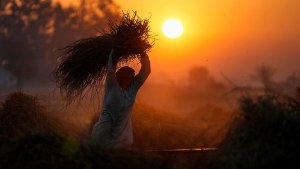 Food and Agriculture
Food and Agriculture
How do we nourish the population, while protecting the planet from the very act of nourishing us?
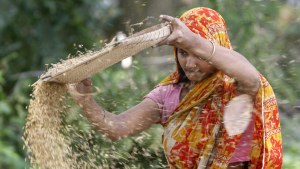 Food and Agriculture
Food and Agriculture
The future of agricultural innovation is dependent on young people. How can we motivate them to get engaged?
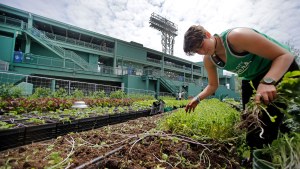 Food and Agriculture
Food and Agriculture
The Youth in Agriculture podcast examines new innovations required to improve the food system.
